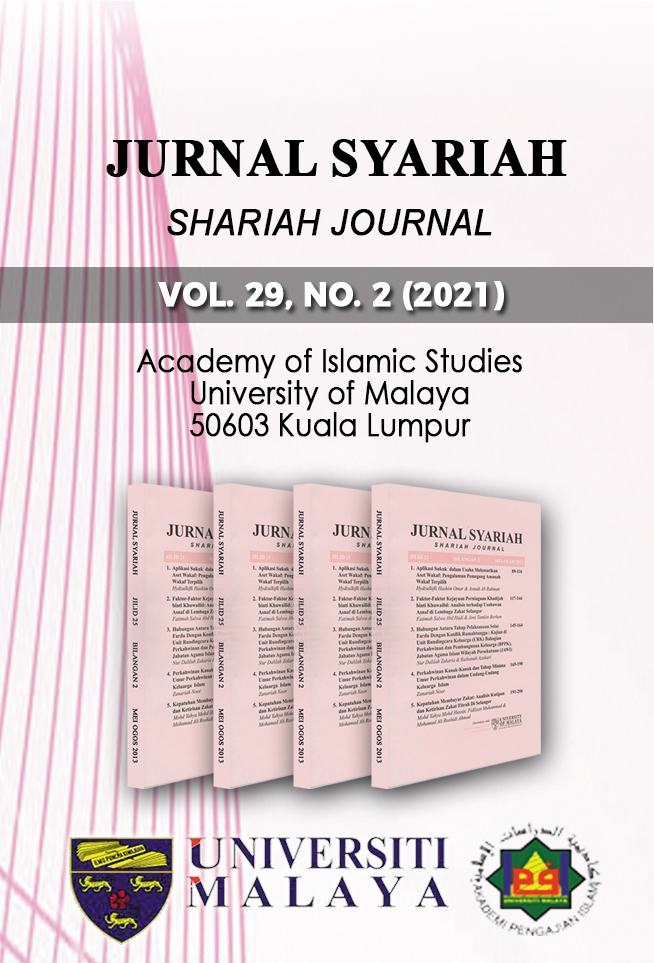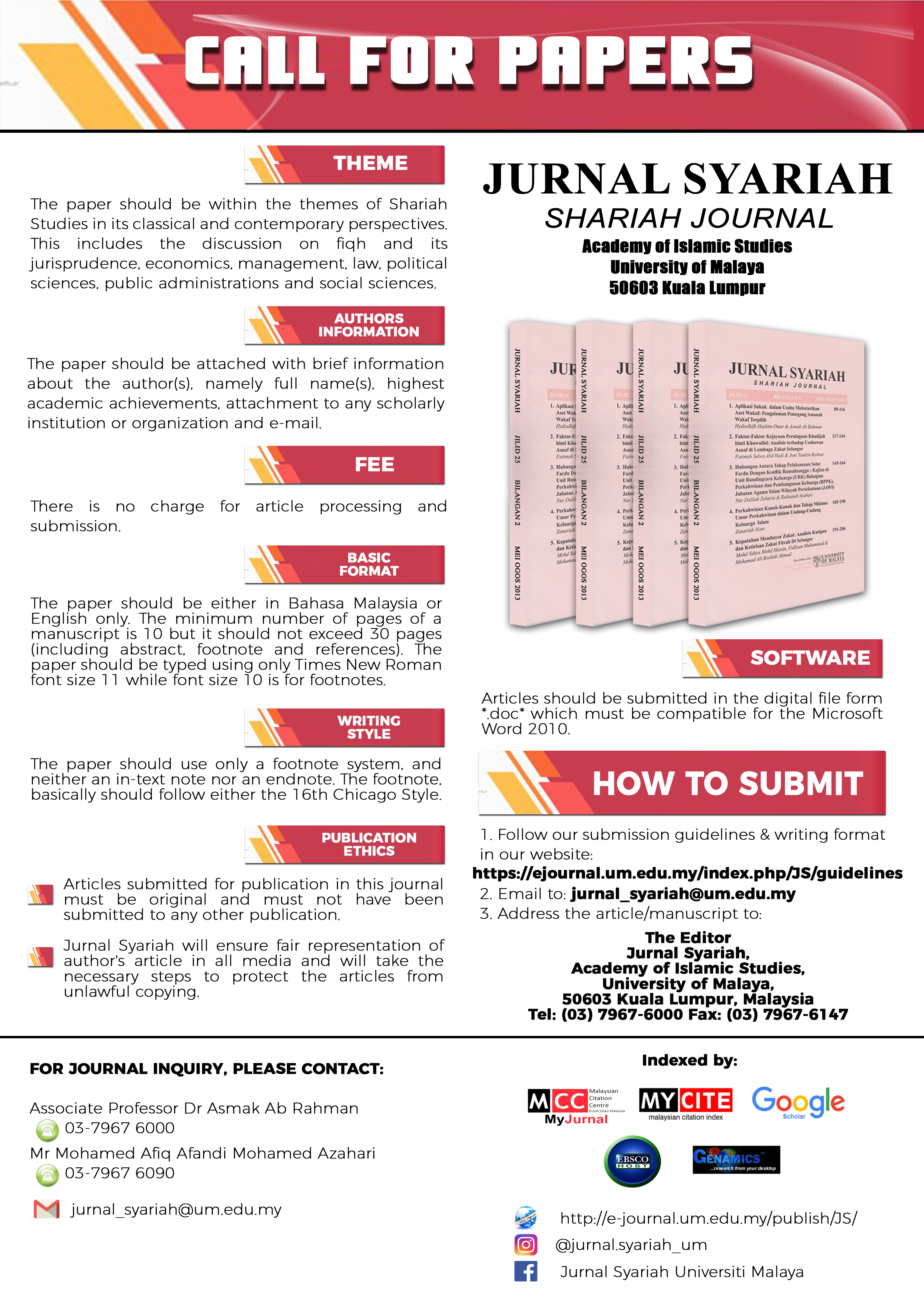THE COMPARATIVE STUDY OF DOWRY REGULATIONS IN INDONESIA AND MOROCCO LEGISLATIONS
DOI:
https://doi.org/10.22452/js.vol29no2.3Keywords:
Dowry/dowry regulations, legislation, Indonesia, MoroccoAbstract
This article compares dowry regulations in Indonesia and Morocco. Bearing in mind that Indonesia and Morocco have different characteristics in dowry matter, the regulations are worth comparing for. As understood in Islamic marriages, dowry is an important obligation and must be fulfilled by the bridegroom for the bride. Normative Islamic teaching advocates for dowry that is simple and reasonable, but in practice, sometimes dowry becomes expensive and difficult to be given, and thus, causing unfavorable effects. In addition, dowry also has the potentials to be subjected to disputes between husband and wife if not regulated by legislation in details. The author uses a comparative study of law guided by a normative approach through library research. The main source is the statutes of two countries. Analysis technique used is content analysis. As a result, it is found that with different backgrounds of fiqh school in Indonesia and Morroco-one being strongly influenced by Shāfi‘ī school and the other is influenced by Mālikī school-have similar rules on dowry. The only significant difference is that the Mālikī School and its legislation in Morocco considers dowry as a marriage pillar. Meanwhile, the Shāfi‘ī school and its legislation in Indonesia, even though the dowry is regarded as compulsory, it does not become a condition or a marriage pillar. Other differences are the definition of dowry, regulation of wife’s luggage, lost dowry, defective dowry, introduction of mithil dowry, regulation of dowry disputes before entering the household, and regulation of furniture disputes other than the wife’s luggage.
Downloads
References
‘Abd al-Raḥmān al-Jazirī, Kitāb al-Fiqh ‘alā Madhāhib al-Arba‘ah (Bayrūt: Dār al-Kutub al-‘Ilmiyyah, 2004).
Ahmad Rofiq, Hukum Perdata Islam di Indonesia (Depok: Rajawali Press, 2017).
Al-Shāfi‘ī, al-Umm, vol. 5 (Bayrūt: Dār al-Ma’rifah, 1393).
Amir Syarifuddin, Hukum Perkawinan Islam di Indonesia (Jakarta: Kencana, 2014).
Amiur Nuruddin & Azhari Akmal Tarigan, Hukum Perdata Islam di Indonesia (Jakarta: Kencana, 2004).
Asriati, ‘Pembaruan Hukum Islam dalam Terapan dan Perundang-Undangan di Indonesia’, Jurnal Hukum Diktum, vol. 10/1 (2012): 23-39.
Fatimah Harrak, ‘ The History and Significance of The New Moroccan Family Code’, http://www.cics.northwestern.edu/documents/workingpapers/ISITA_09-002_Harrak.pdf, accessed on 22 January 2021.
Halimah B., ‘ Konsep Mahar (Maskawin) dalam Tafsir Kontemporer’, Jurnal ad-Daulah, Vol. 6/2 (2017), 310-330.
Harijah Damis, ‘ Konsep Mahar dalam Perspektif Fikih dan Perundang-Undangan Kajian Putusan Nomor 23 K/AG/2012’, Jurnal Yudisial, vol. 9/1, (2016): 19-35.
https://alghad.com/انتهاء-عصر-تقديم-المهور-عند-الزواج-في-ا/#:~:text=وبحسب%20التقاليد%20الاسلامية%20في%20المغرب,شقة%20الزوجية%20وغيرها%20من%20المنقولات, accessed April 1, 2021.https://www.merdeka.com/gaya/hantaran-seserahan-dan-mahar-apa-bedanya.html?page=3, accessed March 30, 2021.
https://en.wikipedia.org/wiki/Dowry#Morocco, accessed April 3, 2021.
https://id.theasianparent.com/adat-pernikahan, accessed April 8, 2021
https://id.wikipedia.org/wiki/Kawin_lari#, accessed April 6, 2021.
https://id.wikipedia.org/wiki/Suku_bangsa_di_Indonesia#, accessed April 5, 2021.
Ibn Qudāmah, al-Mughnī, Vol. 8 (Bayrūt: Dār al-Fikr,1405).
Ibn Rushd, Bidāyah al-Mujtahid wa Nihāyah al-Muqtaṣid (Miṣr: Maṭba‘ah Musṭafā al-Bābī al-Ḥalābī wa Awlāduh, 1395).
Jalāl al-Dīn Muḥammad bin Aḥmad al-Maḥallī, Qalyubī wa ‘Umayrah, vol. 3 (Bayrūt: Dār al-Fikr, 2001).
M.A. Tihami & Sohari Sahrani, Fikih Munakahat: Kajian Fikih Nikah Lengkap (Depok: Rajawali Pers, 2018).
Mardani, Hukum Keluarga Islam di Indonesia (Jakarta: Kencana, 2016).
Mochammad Muslim, ‘Pengaruh Konfigurasi Politik Hukum Orde Baru Terhadap Kompilasi Hukum Islam (KHI) di Indonesia’, al-Daulah, vol. 4/1 (2014): 220-242.
Mohammad Azeemulkah, ‘The evil practice of dowry in India and in the Arab world’ dalam https://timesofindia.indiatimes.com/nri/citizen-journalists/citizen-journalists-reports/mohammad-azeemullah/The-evil-practice-of-dowry-in-India-and-in-the-Arab-world/articleshow/19673234.cms, accessed on 30 January 2021.
Muḥammad al-Farujī, Mudawwanah al-Usrah (Dār al-Bayḍa’: Maṭba’ah al-Najāḥ al-Jadīdah, 2012).
Muḥammad al-Shāfi‘ī, al-Zawāj fī Mudawwanah al-Usrah (Marakesh: Maṭba’ah Waraqah al-Waṭaniyyah, n.d.).
Muḥammad al-Shāfi‘ī, Qānun al-Usrah fī Duwal al-Maghrīb al-‘Arabī (Marakesh: Maṭba’ah Waraqah al-Waṭaniyyah, 2009).
Muḥammad Musṭafā Shiblī, Aḥkām al-Usrah fī al-Islām (Bayrūt: Dār al-Jam’iyyah, 1403).
Muhammad Shobirin, ‘Studi Komparasi Penerapan Mahar di Indonesia dan Malaysia’, (Postgraduate Thesis, Program of al-Ahwal al-Shakhshiyyah UIN Maulana Malik Ibrahim Malang, 2013).
Muji Mulia, ‘Pembaharuan Hukum Islam di Indonesia: Analisis Historis tentang Kompilasi Hukum Islam,’ Islam Futura, vol. 7/1 (2008): 64-85.
Mutia Wardah, ‘Hadhanah Akibat Perceraian dalam Hukum Keluarga di Indonesia dan Maroko’, (Thesis, Program of Hukum Keluarga Islam Fakultas Syariah dan Hukum UIN Jakarta, 2018).
Nia Septyarani, ‘Ketentuan Mahar dalam Perkawinan: Studi Komparatif Hukum Keluarga Islam Yordania dan Pakistan,’ (Thesis, Department of Islamic Family Law, Faculty of Sharia, State Islamic Institute of Ponorogo 2019).
Noryamin Aini, ‘Tradisi Mahar di Ranah Lokalitas Umat Islam: Mahar dan Struktur Sosial di Masyarakat Muslim Indonesia,’ Ahkam, vol. 14/1 (2014): 13-30.
Sālim bin ‘Abd al-Mughnī al-Rāfi‘ī, Aḥkām al-Aḥwāl al-Shakhṣiyyah li al-Muslimīn fī al-Gharb (Bayrūt: Dār Ibn Ḥazm, 2003).
Sayyid Sābiq, Fiqh al-Sunnah, vol. 2 (Bayrūt: Dār al-Fikr, 1412).
Suparman Usman & Yusuf Somawinata, Fiqh Mawaris (Jakarta: Gaya media Pratama, 2002).
‘Umar Sidī, ‘al-Ḥimāyah al-Qānūniyah li Ḥaqq al-Zawjah fi al-Ṣadāq,’ Majallah al-Ijtihād li al-Dirāsat al-Qānūniyyah wa al-Iqtiṣādiyah, vol. 8/2 (2019): 56-68.
Wahbah al-Zuḥaylī, al-Fiqh al-Islāmi wa Adillatuh, vol. 9 (Dimashq: Dār al-Fikr, n.d.).
Wuzārah al-‘Adl, Dalīl ‘Amalī li Mudawwanah al-Usrah (Rabaṭ: Jam‘iyyah al-Ma‘lūmah al-Qānūniyyah wa al-Qaḍa’iyyah, 2004).
Wuzārah al-Awqāf wa al-Shu’ūn al-Islāmiyyah Kuwayt, al-Mawsū‘ah al-Fiqhiyyah al-Kuwaytiyyah, vol. 38 (Miṣr: Maṭabi’ Dār al-Ṣafwah, 1427).
Statutes
President of The Republic of Indonesia Instruction Number 1 of 1991 about Dissemination of Islamic Law Compilations (Inpres No. 1, 1991).
Downloads
Published
How to Cite
Issue
Section
License

This work is licensed under a Creative Commons Attribution-NonCommercial 4.0 International License.
COPYRIGHT: All rights reserved. Not allowed to be reproduced any part of articles and contents of this journal in any form or by any way, whether electronic, mechanical, photocopying, recording or otherwise without permission in writing from the Chief Editor, Jurnal Syariah.



















